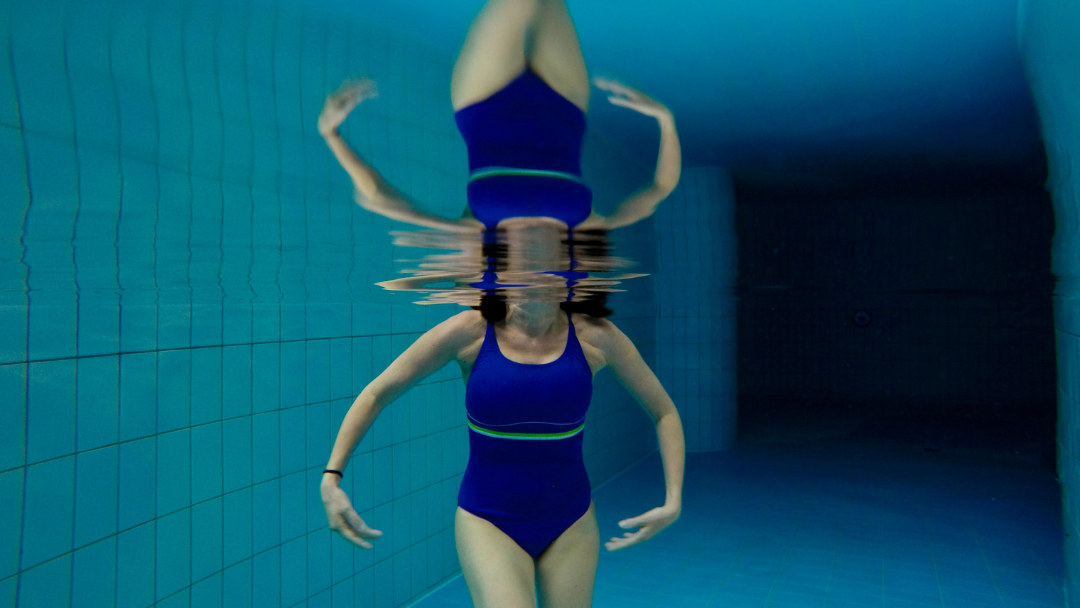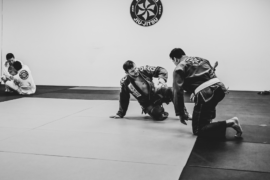My twelve-year-old daughter started synchronized swimming last year in the pool down the street. It was easy for her to go back and forth by herself. Sometimes I would walk the four minutes to pick her up. We’d walk home together, and she would tell me what positions they worked on or the warmup exercises they did. It’s a club level thing, just once a week. I was proud of her for wanting to join, and she quickly made friends with her little team. I did synchro when I was young for years, inspired by my big sister and her high school team, The Spiralettes.
This year my daughter’s swimming practice moved to a different pool, two tram stops and a ten-minute walk away. We decided that on Tuesday nights I would do laps while she was at practice. I could get some regular exercise, and she wouldn’t have to come home by herself, especially in the winter when the sun goes down so early.
Synchronized swimming was a good option for my daughter. She tried competitive swimming but hated the practices, the coach barking at her when she wanted to catch her breath. It’s a lonely task, swimming. A solitary task. It’s work. I enjoy the solitude most times, counting the laps off in my head. I forget about the laundry pile, the dog or what to make for dinner, instead concentrating on how my body feels. I don’t necessarily swim to look good, although I gladly welcome any benefit. I’m trying to be healthy, extend my life. But it is work and unless you are part of a team, it can be a lonesome workout.
Swimming is also an organized activity, at least in most Parisian pools I’ve been to. There are clearly marked lanes for fast swimmers and slow swimmers. There is usually a space for ancient people doing breaststroke, new learners or leisure seekers who want to be in the water.
Crowded pools in Paris can be aggressive, and you may need to keep up with the pack. You may be obliged to daringly pass a slow swimmer. This requires you to venture into the middle of the lane and swim like hell before the person opposite threatens to hit you head on. This Tuesday night pool is polite, and I have softened as I age. I feel less pressure to pass anyone. And I don’t have to speak French. Sure, I’ll utter a pardon or an allez-y now and then, but even that can be accomplished with a silent nod or shake of the head. I’m usually counting in English, allowing my mind to ramble in English. I’m swimming in English. No one needs to know.
And God, it feels so good when I’m done. I deserve a glass of wine. I glory in the warm exhaustion of my muscles. I’m smugly propelled into thinking I’m a better person than anyone who has not done Tuesday night swimming. When I’m in the lobby afterwards, hair still damp, waiting for my daughter, I slyly glance at the other parents who have ambled in to pick up their kids.
Nevertheless, it remains a one-woman gig. In our first Tuesday night session, the shower room was deserted as I washed up. I padded cautiously, dripping wet, down the hall from the showers to my locker. I sheepishly passed the woman with the mop, hoping she wouldn’t notice. With no one else around, I stripped off my wet suit out in the open instead of shoving myself into a bad-smelling changing stall with hair stuck to the floor. I took my time, putting on deodorant and face cream. I went to the mirror to brush my hair, staring at the deep line on my forehead from the cap and the embarrassing bruises around my eyes from the goggles. I gathered up my things before heading to the hairdryers. Neatly wrapping my suit in my towel, I wondered how the hell I got there –alone in a pool locker room in Paris, speaking to no one.
#
I started swimming when I was seven years old. Our school district had a strong swimming program for all ages, with the littlest ones part of the Baby Eagles team. I swam competitively for two years. Backstroke was my stroke. I have a handful of third place ribbons my parents kept in a manila folder. I moved to synchronized swimming when I was nine. Synchro is collective, a group activity. I did it because my oldest sister Theresa did it. She was eight years older than me. Tall with a full bosom and hip bones that stuck out prominently through her suit, I wanted to be her most of the time. After seeing one of her first synchro shows full of dramatic music and beautiful bodies, I knew I wanted to be in that pool.
I have fond memories of our Eagles pool. The locker room was a smallish rectangle with stacked lockers littered with red and black Master combination locks. The open shower room had nozzles along the wall and a central cylinder our team gathered around as if it was a microphone or a Christmas tree. We stood on a wooden bench on one side of the locker room to dry our hair, round white hair dryers mounted on the wall.
Mustard yellow semi-transparent doors that opened like garage doors in summertime enclosed the pool area. A triangle of low, medium, and high diving boards stood at one short end. At the other end, the pool office beamed out at us from a large window. We stole glances at the coaches standing next to desks stacked with piles of paper.
Synchro was hard work but fun. We practiced swimming underwater without taking a breath. We practiced the required figures: ballet legs, pikes, front and back walkovers, kips, and barracudas. We practiced outside the pool, making the motions with our hands and moving into position and always counting to eight. We practiced the timing of our deck work, the dance we did on deck before jumping or diving into the pool. We did basic ballet exercises to lengthen our legs and point our toes.
We had synchro bodies. We were not super skinny but synchro wasn’t a sport that bulked us up either. We had thighs like slabs of smooth chicken breast. The Kaufold sisters, four of them, were blond, stout and fast with good posture. Erin and Heather Sunday had long legs. Stacie Cuthbertson had big boobs. Krista Messner had thick curly hair that poked out of her cap. We did our group routine to the Star Wars theme song. I have long forgotten the moves. But when I hear that song, memories of counting to muffled music and navigating the bottom of the pool through a tangle of arms and legs bubble to the surface.
After practice we gathered in the locker room, laughing, talking, and making fun of each other. We wore two workout swimsuits at a time, a trick we picked up from the older girls. We hung them on our locks outside our lockers to dry overnight. I liked seeing mine lined up, hanging motionless among all the others.
I swam for ten years in the Eagles pool. I can still picture the garage doors like murky stained glass tableaus of dark yellow and light green, allowing only outlines and forms of bodies to pass through. I can still smell the mixture of chlorine, rubber, nylon and sweat. I can almost feel that pressure in my head and nose, a clogged ear I shook recklessly, determinedly. On car rides home from synchro practice, I let the weariness sink in, allowing my dad to safely take over. The car felt grounded, and I fingered the fraying seat, my damp pool bag aside my leg. In bed at night I brought the back of my hand up to my nose to breathe in the lingering chlorine on my skin.
#
My childhood friend Kelly visited us a month after we started Tuesday night swims. We played basketball and field hockey together in middle school and high school. She later went on to be a ski instructor, and her brother runs a summer camp on the East Coast. She lives in Colorado now and has two boys. They are outdoorsy types. She worked for a university for a long time and recently took over as director of a non-profit. She was on a work trip to France for her new job. It had been more than five years since I last saw her during a family vacation to Colorado. But we remembered each other easily the way old friends do. When she stepped out of the taxi in front of our apartment, she was wearing a smart car coat and clean hiking shoes, a mature, chic woodsy style about her. She had the same sharp giggle and it escalated to a tra-la-la-ing full bodied laugh the same way it always did.
We spent time thrift shopping around Paris; she was always into that. My daughters were excited to take her to a vide-grenier a few streets away. We found a few bargains: a blue and white shawl made in Iran for her and a black and red houndstooth dress with a rip in the armpit for me. I took her to some of the big thrift shops around rue Montorgueil. I stared at her as she tried on sweaters, taking them off the same way she always did, crossing her long arms and lifting up her elbows, then carefully rolling the fabric up along her torso.
My daughters loved having her around and prodded her for stories of when we were young. She played along with everything: cards, board games, walking the dog, cooking, translating funny words, reading a comic book in French with my daughter. The night before she left, we played Dixit, a game where you choose one word to describe a picture. My youngest daughter picked a literal word for each image. For a picture of a table full of food, she said “hungry.” For a picture of a sandy beach with a bright sun, she said “summer.” We all easily guessed her cards and finished in hysterical giggles. Being a school night, I told the girls it was time to get ready for bed. They looked at Kelly and pleaded to stay up since it was her last night. I rolled my eyes. Kelly traitorously took their side and said, “C’mon Trish, it’s a party! Girls, how do you say party in French? Fête?” The three of them started chanting and pounding on the table with their fists gleefully, “la fête, la fête, la fête!”
The day Kelly left I took my daughter to practice. I heard her getting changed with her friends on the other side of the locker room, their excited voices rising up. Memories of my own swimming practices flashed back to me as I climbed into the pool and kicked off the wall: the gaggle of girls all changing at the same time, the comfortable chaos of bodies. I thought of Kelly’s laugh and her long arms. I thought of my swimsuit hanging among all the suits, of my hair warm under the dryer, going from wet to damp to hot and dry. I thought about sitting securely in the car with my dad. I sloppily approached the end of the lane. I reached for the pool edge and bumped intimately into the bare shoulder of one of the men in my lane. “Sorry!” I choked out instinctively, wrapped up in my sorrow, forgetting my French. He cocked his head and gave me a wide toothy smile, this goofy masked stranger. He held that look for an instant, said nothing, then pushed off to start his next lap.
PATRICIA POWERS
Like what you’re reading?Get new stories, sports musings, or book reviews sent to your inbox. Drop your email below to start >>>
NEW book release AWRY by duncan b. barlow. Order the book of stories of which Brian Evenson calls “meticulous and precise, painful and surprising.”
GET THE BOOK



